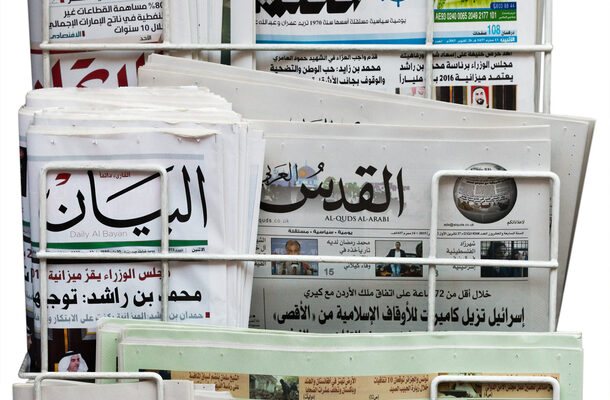News agencies of countries who despise Iran focused on expressing their governments’ urging of restraint on all sides.
By Batya Jerenberg, World Israel News
Arab media outlets, including those of countries without diplomatic relations with Israel, appeared to be walking a fine line in their coverage of Iran’s unprecedented military attack on Israel over the weekend, highlighting calls for restraint on both sides.
The Saudi Press Agency quoted the kingdom’s ministry of foreign affairs urging of “all parties to exercise maximum restraint and to protect the region and its people from the dangers of war.”
The Saudi-owned Asharq Al-Awsat newspaper headquartered in London factually reported what occurred, quoting IDF sources extensively regarding the failure of a single Iranian missile to penetrate Israel’s air defense.
It then quoted without comment the unfounded boast of Iranian Revolutionary Guard Corps head Hossein Salami, that said that his country’s cruise missiles “were able to pass through the precise defense and complex protection carried out by Israel with the help of America in the Iraqi, Jordanian, and even Syrian airspace,” and that he had “information that they were successful and achieved their goals accurately.”
Iran’s official mouthpiece, the IRNA news agency, had claimed that the IDF’s biggest airbase in the Negev had suffered “severe damage” from the missile attack. Israel reported some insignificant damage to the site.
Iranian state TV went further, saying that “half” of the missiles “hit their targets successfully.”
The UAE’s official mouthpiece, WAM, publicized the statement of the Gulf Cooperation Council that it said “emphasized the importance of maintaining regional and global security and stability in light of recent developments in the Middle East.”
Egyptian media talked of Cairo’s “deep concern” over the escalation, parroting the common mantra of urging “restraint” on both sides.
Many articles in the Arab press noted world leaders’ condemnations of the Iranian attack, such as Qatari-owned Al Jazeera, which especially quoted French President Emmanuel Macron’s support of Israel at this time.
French jets had joined American, British and Israeli planes in shooting down dozens of some 300 cruise missiles and drones Iran launched overnight Saturday at Israel.
They also speculated about possible scenarios of an Israeli counter-attack, with some reporting on the fact that U.S. President Joe Biden has already told Jerusalem not to do so.
The Iranian mission to the United Nations said outright that while Tehran’s attack was a legitimate answer to Israel’s attack on its diplomatic premises, which is a violation of international law, “The matter can be deemed concluded” unless “the Zionist regime” escalates matters.
While there were no outright condemnations of Iran noted in these Arab sources, there were also no condemnations of Israel for its alleged assassination two weeks ago of seven top Iranian military men in Damascus, including Brig. Gen. Mohammad Reza Zahedi, the head of the Quds Force of the Iranian Revolutionary Guards Corps (IRGC).
This airstrike had enraged Tehran, which had immediately vowed to strike Israel in retaliation.
These calm media reports also reflected the fact that Iran has not managed to break the growing alliance of moderate Arab states and Israel against the mullahcracy.
Fear of Iran’s hegemonic obsession with taking over their countries is still seemingly stronger than any dislike of Israel’s presence in the region, with the Jewish state being seen as the only actor taking on the Islamic Republic on a consistent basis, albeit through indirect and stealthy means to date.





